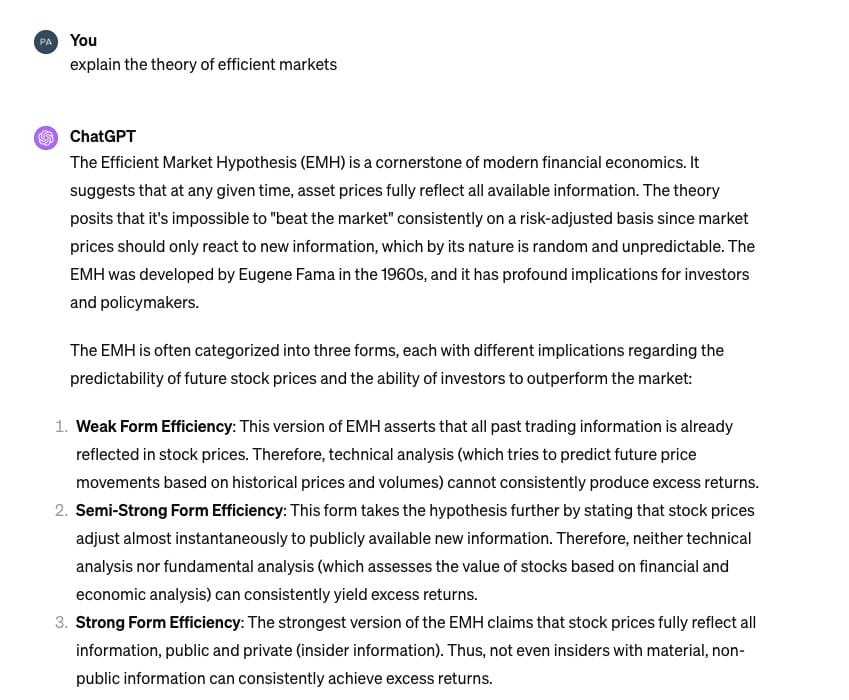The Efficient Market Hypothesis

From chatGPT:
The Efficient Market Hypothesis (EMH) is a cornerstone of modern financial economics. It suggests that at any given time, asset prices fully reflect all available information. The theory posits that it's impossible to "beat the market" consistently on a risk-adjusted basis since market prices should only react to new information, which by its nature is random and unpredictable. The EMH was developed by Eugene Fama in the 1960s, and it has profound implications for investors and policymakers.
The EMH is often categorized into three forms, each with different implications regarding the predictability of future stock prices and the ability of investors to outperform the market:
- Weak Form Efficiency: This version of EMH asserts that all past trading information is already reflected in stock prices. Therefore, technical analysis (which tries to predict future price movements based on historical prices and volumes) cannot consistently produce excess returns.
- Semi-Strong Form Efficiency: This form takes the hypothesis further by stating that stock prices adjust almost instantaneously to publicly available new information. Therefore, neither technical analysis nor fundamental analysis (which assesses the value of stocks based on financial and economic analysis) can consistently yield excess returns.
- Strong Form Efficiency: The strongest version of the EMH claims that stock prices fully reflect all information, public and private (insider information). Thus, not even insiders with material, non-public information can consistently achieve excess returns.
This is my favorite part:
"Strong Form Efficiency: The strongest version of the EMH claims that stock prices fully reflect all information, public and private (insider information). Thus, not even insiders with material, non-public information can consistently achieve excess returns."
🤣😆🤣 what a load of horseshit!
Dear readers. I present to you the greatest stock trader of all time: Paul Tudor Jones, William Delbert Gann, Richard Wyckoff, Steven Cohen, Paul Pelosi:

For those of you unfamiliar with this man, he's Nancy Pelosi's husband who made the most amazingly accurate stock trades in history. Why? Simple. Nancy Pelosi, being a top Democrat and also Speaker of the House (allegedly), had access to top secret and classified market moving information (allegedly) which she passed on to her husband (allegedly and Dave Chapelle version 🤣). So, the efficient market hypothesis is total garbage since this man made hundreds of millions on insider information.
Stop reading theory and listening to bullshit. Just watch the market. It is the premiere world wide destination for cheaters. You've heard "Follow the money". It's such a vague and broad statement that's incredibly hard to unravel. But once you change it to "Follow the money on the stock market". Then it becomes much easier. And things become more clear. As I get more time I'll show more examples here.
